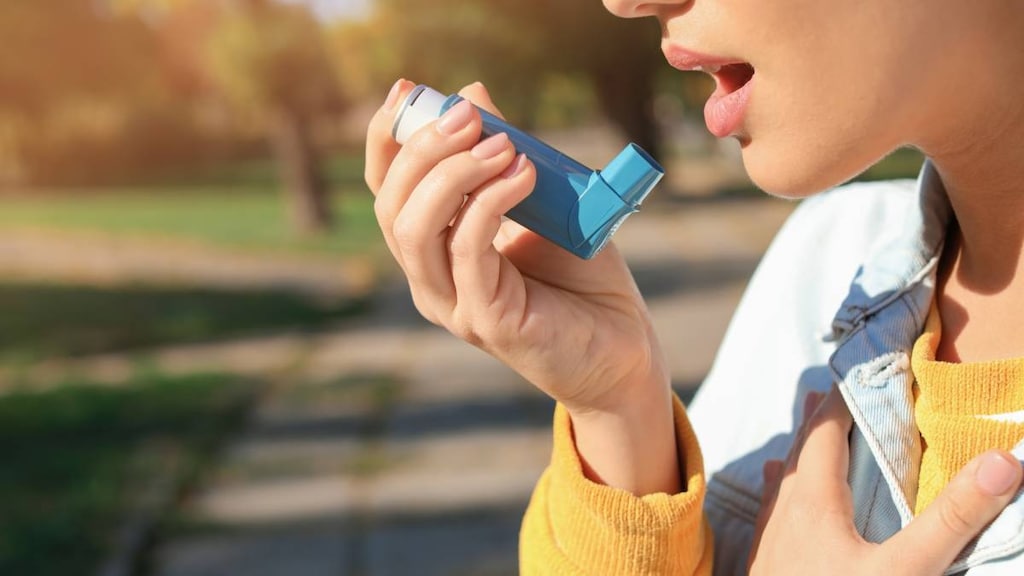What is ciclesonide used for?
- Ciclesonide is used to treat asthma.
- Do not use ciclesonide to treat an asthma attack. Use a rescue inhaler. Talk with your doctor.
Before taking ciclesonide, tell your doctor:
- If you are allergic to ciclesonide; any part of this medicine; or any other drugs, foods, or substances. Tell your doctor about the allergy and what signs you had.
This is not a list of all drugs or health problems that interact with ciclesonide.
Tell your doctor and pharmacist about all of your drugs (prescription or OTC, natural products, vitamins) and health problems. You must check to make sure that it is safe for you to take ciclesonide with all of your drugs and health problems. Do not start, stop, or change the dose of any drug without checking with your doctor.
What are some things I need to know or do while I take ciclesonide?
- Tell all of your health care providers that you take ciclesonide. This includes your doctors, nurses, pharmacists, and dentists.
- This medicine is not helpful during an asthma attack.
- Call your doctor right away if your breathing problems get worse, if your rescue inhaler does not work as well, or if you need to use your rescue inhaler more often.
- It may take several weeks to see the full effects.
- This medicine may cause weak bones (osteoporosis) with long-term use. Talk with your doctor to see if you have a higher chance of weak bones or if you have any questions.
- Have a bone density test as you have been told by your doctor. Talk with your doctor.
- This medicine may raise the chance of cataracts or glaucoma. Talk with the doctor.
- Have your eye pressure checked if you are on ciclesonide for a long time. Talk with your doctor.
- If you have been taking ciclesonide for many weeks, talk with your doctor before stopping. You may want to slowly stop ciclesonide.
- You may have more chance of getting an infection. Wash hands often. Stay away from people with infections, colds, or flu.
- Chickenpox and measles can be very bad or even deadly in some people taking steroid drugs like ciclesonide. Avoid being near anyone with chickenpox or measles if you have not had these health problems before. If you have been exposed to chickenpox or measles, talk with your doctor.
- When changing from an oral steroid to another form of a steroid, there may be very bad and sometimes deadly side effects. Signs like weakness, feeling tired, dizziness, upset stomach, throwing up, not thinking clearly, or low blood sugar may happen. Call your doctor right away if you have any of these signs. If you have a bad injury, have surgery, or any type of infection, you may need extra doses of oral steroids. These extra steroids will help your body deal with these stresses. Carry a warning card saying that there may be times when you may need extra steroids.
- This medicine may affect growth in children and teens in some cases. They may need regular growth checks. Talk with the doctor.
- Tell your doctor if you are pregnant or plan on getting pregnant. You will need to talk about the benefits and risks of using ciclesonide while you are pregnant.
- Tell your doctor if you are breast-feeding. You will need to talk about any risks to your baby.
How is ciclesonide best taken?
Use ciclesonide as ordered by your doctor. Read all information given to you. Follow all instructions closely.
- Keep using ciclesonide as you have been told by your doctor or other health care provider, even if you feel well.
- For breathing in only.
- Prime by spraying 3 sprays before first use or if ciclesonide has not used for 10 days.
- Rinse out mouth after each use. Do not swallow the rinse water. Spit it out.
- Clean mouthpiece by wiping with a dry tissue or cloth. Do not wash or put in water.
- Put the cap back on after you are done using your dose.
- If you are taking more than 1 inhaled drug, talk to your doctor about the best order for taking your drugs.
- Do not use near an open flame or while smoking. It may burst.
What do I do if I miss a dose?
- Use a missed dose as soon as you think about it.
- If it is close to the time for your next dose, skip the missed dose and go back to your normal time.
- Do not use 2 doses at the same time or extra doses.
What are the side effects of ciclesonide that I need to call my doctor about immediately?
WARNING/CAUTION: Even though it may be rare, some people may have very bad and sometimes deadly side effects when taking a drug. Tell your doctor or get medical help right away if you have any of the following signs or symptoms that may be related to a very bad side effect:
- Signs of an allergic reaction, like rash; hives; itching; red, swollen, blistered, or peeling skin with or without fever; wheezing; tightness in the chest or throat; trouble breathing, swallowing, or talking; unusual hoarseness; or swelling of the mouth, face, lips, tongue, or throat.
- Signs of infection like fever, chills, very bad sore throat, ear or sinus pain, cough, more sputum or change in color of sputum, pain with passing urine, mouth sores, or wound that will not heal.
- Signs of a weak adrenal gland like a very bad upset stomach or throwing up, very bad dizziness or passing out, muscle weakness, feeling very tired, mood changes, not hungry, or weight loss.
- Signs of Cushing's disease like weight gain in the upper back or belly, moon face, very bad headache, or slow healing.
- Feeling very tired, weak, or touchy; trembling; having a fast heartbeat, confusion, sweating, or dizziness if you missed a dose or recently stopped ciclesonide.
- Redness or white patches in mouth or throat.
- Chest pain or pressure.
- Bone pain.
- Feeling very tired or weak.
- Change in eyesight.
- This medicine can cause very bad breathing problems right after you take a dose. Sometimes, this may be life-threatening. If you have trouble breathing, breathing that is worse, wheezing, or coughing after using ciclesonide, use a rescue inhaler and get medical help right away.
What are some other side effects of ciclesonide?
All drugs may cause side effects. However, many people have no side effects or only have minor side effects. Call your doctor or get medical help if any of these side effects or any other side effects bother you or do not go away:
- Headache.
- Stuffy nose.
- Sinus pain.
- Nose and throat irritation.
- Signs of a common cold.
- Joint pain.
- Back pain.
- Pain in arms or legs.
These are not all of the side effects that may occur. If you have questions about side effects, call your doctor. Call your doctor for medical advice about side effects.
You may report side effects to the FDA at 1-800-332-1088. You may also report side effects at https://www.fda.gov/medwatch.
If overdose is suspected:
If you think there has been an overdose, call your poison control center or get medical care right away. Be ready to tell or show what was taken, how much, and when it happened.
How do I store and/or throw out ciclesonide?
- Store at room temperature.
- Protect from heat or open flame. Do not puncture or burn even if it seems empty.
- Some inhalers have a dose counter to keep track of how many doses are left. If your inhaler has a dose counter, throw the inhaler away when the dose counter reaches "0."
- Keep all drugs in a safe place. Keep all drugs out of the reach of children and pets.
- Throw away unused or expired drugs. Do not flush down a toilet or pour down a drain unless you are told to do so. Check with your pharmacist if you have questions about the best way to throw out drugs. There may be drug take-back programs in your area.
Consumer information use and disclaimer
- If your symptoms or health problems do not get better or if they become worse, call your doctor.
- Do not share your drugs with others and do not take anyone else's drugs.
- Some drugs may have another patient information leaflet. Check with your pharmacist. If you have any questions about ciclesonide, please talk with your doctor, nurse, pharmacist, or other health care provider.
- If you think there has been an overdose, call your poison control center or get medical care right away. Be ready to tell or show what was taken, how much, and when it happened.
This information should not be used to decide whether or not to take ciclesonide or any other medicine. Only the healthcare provider has the knowledge and training to decide which medicines are right for a specific patient. This information does not endorse any medicine as safe, effective, or approved for treating any patient or health condition. This is only a brief summary of general information about this medicine. It does NOT include all information about the possible uses, directions, warnings, precautions, interactions, adverse effects, or risks that may apply to ciclesonide. This information is not specific medical advice and does not replace information you receive from the healthcare provider. You must talk with the healthcare provider for complete information about the risks and benefits of using this medicine.



